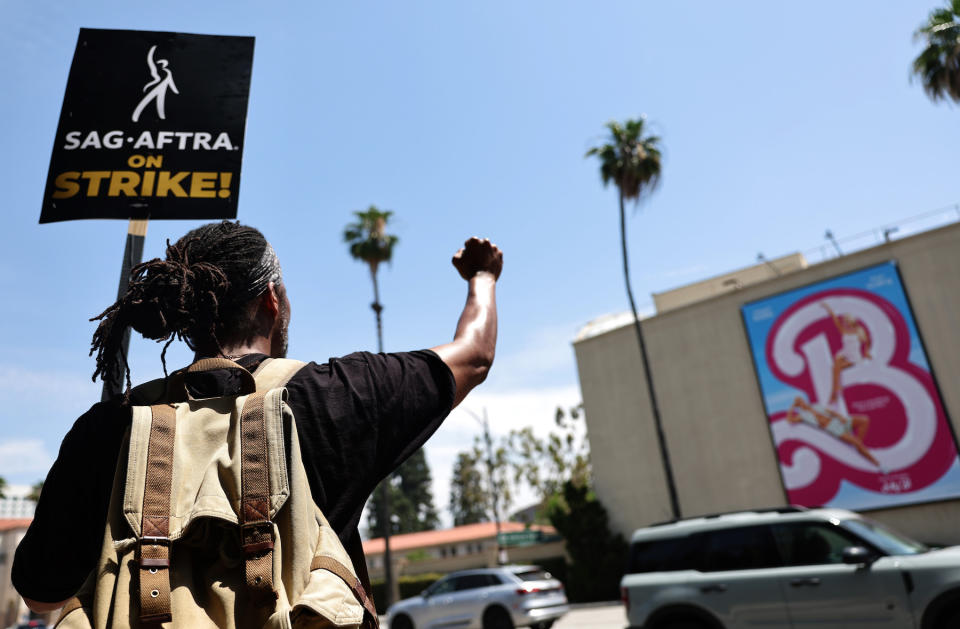Hollywood Actors Are Striking. But on Broadway, the Show Must Go On.

Actors have now taken to the streets, walking shoulder to shoulder on picket lines with members of the Writers Guild of America (WGA) after failing to secure an equitable contract with the Alliance of Motion Picture and Television Producers (AMPTP). We are one week into the SAG-AFTRA strike, and, as actors and writers fight for their future, a union representing Broadway crew members reached a tentative agreement Thursday with the Broadway League and Disney Theatrical Productions, averting their own potential strike. As entertainment unions press pause on upcoming films and streaming shows — excluding some non-AMPTP indie productions that can continue to film because they’ve satisfied SAG-AFTRA conditions — Broadway shows will go on.
The Actors’ Equity Association represents more than 51,000 stage managers and actors across the country and oversees all theatrical work in the United States, which means stage work is not part of the SAG-AFTRA strike. But overlap exists. In fact, many actors are members of both unions: think Josh Groban in Sweeney Todd, Ben Platt in Parade, and Daniel Radcliffe in the upcoming Merrily We Roll Along. To Kate Shindle, president of the Actors’ Equity Association, it’s important to support sibling unions.
More from Rolling Stone
'Spider-Man: Beyond the Spider-Verse' Removed From 2024 Release Date
Will Smith Calls Actor and Writer Strikes a 'Pivotal Moment for Our Profession'
“Workers have had enough,” Shindle wrote in a statement to Rolling Stone. “For far too long, the arts and entertainment industry has relied on unpaid and underpaid labor to keep the lights on – and, in some cases, to create massive wealth.”

The Broadway League, which represents industry producers, presenters, and general managers, was not free of strike threats. Actors’ Equity bargained with the Broadway League as early as mid-January to establish a new touring contract, and issued a strike authorization vote in April on all Broadway national tours. That same month, Actors’ Equity approved a new touring agreement that included more competitive salaries, producer-paid housing options, and new coverage models for actors and stage managers who got sick or injured.
The International Alliance of Theatrical Stage Employees (IATSE), which recently announced a tentative agreement, represents Broadway crew members who fall under the “Pink Contract.” “Pink Contract” workers work as stagehands, wardrobe personnel, makeup artists, and hairdressers. They’re hired by the production and work on out-of-town tryouts, later hitting Broadway or a touring show.
Prior to the tentative deal, the union had made advances in employer-provided housing for touring crews and maintained employer-provided health care without digging into other plans. Without these crew members, who are involved in 45 theatrical productions – 28 Broadway shows and 17 touring shows – audiences could have witnessed a familiar pause on Broadway.
India Bolds Browne, a Lion King performer, says as Broadway crew members prepared for a potential strike, tense conversations around a potential Broadway shutdown filled the backstage dressing rooms. Disney Theatrical, which signed the tentative deal with IATSE, represents The Lion King. Browne, an Actors’ Equity union member for the last decade, says she feels guilty going into work, recognizing her SAG-AFTRA members and writers are striking, but encouraged theatergoers to support live shows and recognize stage performers as human beings worthy of decent pay, too.
“The reality is we all want fair rights for everyone involved because who’s to say in a couple of years that won’t affect us on some fronts,” Browne says, as she drove to a Friday evening performance of the Lion King. “So you always want to show support to the maximum.”
Theatrical productions took a serious financial hit during the pandemic, and are still in need of a post-Covid boost, claimed Shindle.
“When you see an Equity show in your community, you’re not only upvoting fair wages and benefits for arts workers onstage and backstage, you’re also supporting all the nearby small businesses that rely on a healthy local theatre for their own survival,” Shindle told Rolling Stone. “Buy a ticket, see a show, and make sure these institutions survive.”
Best of Rolling Stone

